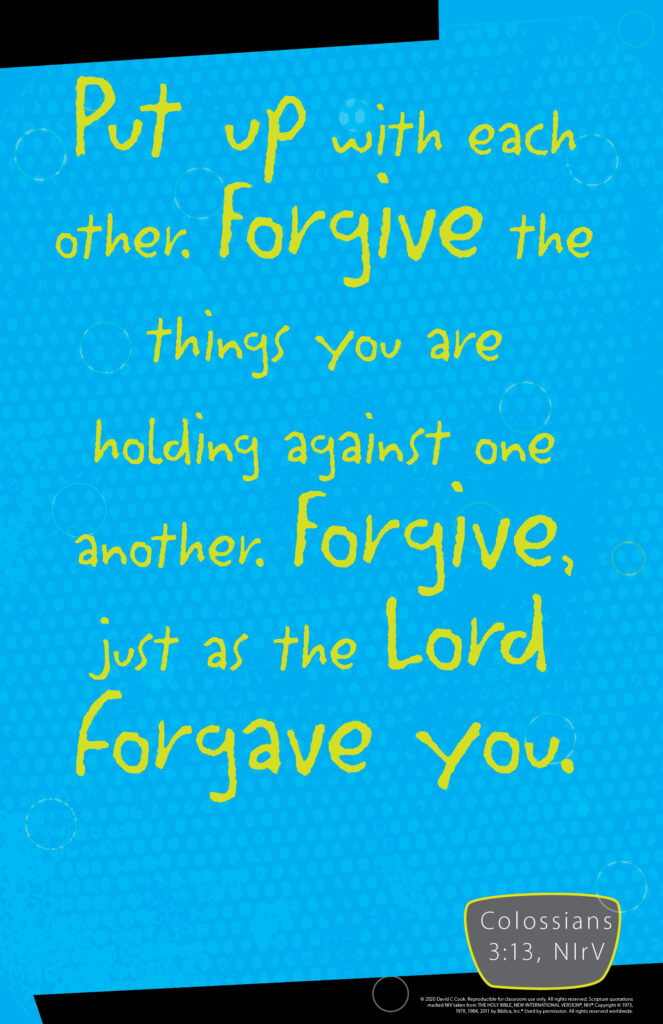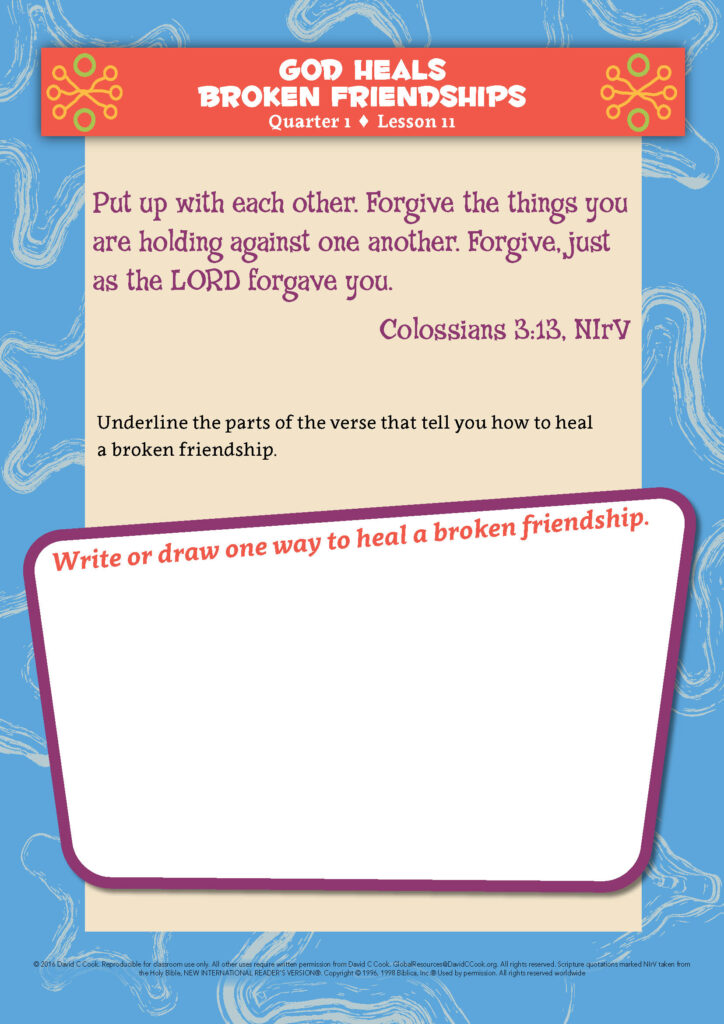During the lesson, the information for you to know is written in regular type, and what we suggest speaking or reading aloud to children is in bold. All resources for this lesson, including the Teacher Guide, Student Page, Family Connection Card, and other resources can be downloaded in a ZIP file by clicking on the following link:
In some lessons you will find "resource articles." These are articles written by experts from around the world to help equip you for your work with children and adolescents. Share them with parents or guardians if you consider it appropriate.
Option: Before class, if you are using the optional supplies, before class create slips of paper for a game about how grudges kill friendships. On all but 1 of the papers, write, “good friend.” On that 1 paper, write, “holding a grudge.” Fold the papers and keep them secret. If you have a large class, do this activity with just 20 students.
May God, who gives this patience and encouragement, help you live in complete harmony with each other, as is fitting for followers of Christ Jesus. Then all of you can join together with one voice, giving praise and glory to God, the Father of our Lord Jesus Christ.
Romans 15:5–6, NLT
It can be hard to live in harmony with others. Feelings get hurt. Misunderstandings happen. People—including us—can be selfish. So how do we live in harmony with others? Through the power of God’s Spirit. This verse promises that He who gives us patience and encouragement will also help us live in harmony with each other.
While we benefit from getting along with others, the purpose is bigger than just that. It is that we can give praise and glory to our God and Father together. Once again we can see how God created us for relationship—with Him and with others. He receives glory when we live in harmony together.
What does living in harmony look like in your life? Think of those relationships and thank God for each one.
What relationships do you have that are broken right now? Pray for those relationships. Ask the Father to help you mend what has been broken, if you are able. Trust Him to help mend those broken relationships, even if you do not see a way right now.
Let your children’s families know that this lesson deals with problems that can occur in friendships. The children will learn skills that help them reconcile with friends, let go of grudges, and ask God to help them heal broken friendships.
Teacher Tip: If possible, email or text the Family Connection Card to the families of your students.
Welcome your children to class. By now you are probably seeing friendships develop. When you see good friendships, point them out to your students. It will encourage those in that friendship and all the others.
Friendships are wonderful things! We have learned how God created friendship and how friends can be trusted. Today we will learn about how to reconcile with a friend when you have had an argument.
First let’s do an activity to show what happens when you hold on to hurt and anger after an argument with a friend. Holding on to hurt and anger is called holding a grudge.
Things such as holding on to grudges or gossiping can kill friendships. Let’s see how that might work in this game. I will whisper the phrase “good friend” to all of you except one person. That one person will hear “holding a grudge.” Do not tell anyone else what your phrase is.
Quickly whisper the phrases to each child. Be sure one child is told the phrase, “holding a grudge.”
Optional Supplies:
If you are using the optional slips of paper, give one to each child. All the children except 1 will have a slip of paper that says “good friend.” One child will have the slip of paper that says “holding a grudge.” Remind them not to tell or show anyone else the message.
End of Option
When we start, everyone will go around and whisper in another person’s ear, “Are you a good friend?” That person will whisper the answer of the phrase he was told. You will keep doing this with others in the group. If you ask this question to the one person who answers “holding a grudge,” he or she will say, “I am holding a grudge.” If you hear this, you should walk away like normal, count to 20, then fall to the floor because the grudge killed your friendship. The reason you that you count to 20 silently is so you will not reveal who is holding the grudge by dropping right away. Everyone keeps going around asking the question until only one person is left standing—the person holding the grudge.
Once the game is over, discuss it with the children.
Even though in our game this person was the last one standing, he was standing alone. He killed all his friendships because he was holding on to a grudge. This is why God asks us to let go of our grudges.
Sometimes misunderstandings and holding grudges happen between friends. You think you heard one thing, but the friend was saying something else. You hurt your friend and now she is holding a grudge. When you have a problem with a friend, it is best to resolve it by talking directly to her.
Gossip is talking about other people or about their lives in a way that is harmful. What is said may be true, or it may not be. It is telling this information to someone who does not have the right to know.
Here is a verse from the Bible that tells us what God says about gossip:
A troublemaker plants seeds of strife; gossip separates the best of friends.
Proverbs 16:28, NLT
God says gossip hurts a friendship, and we all know that is true. We all make mistakes in our friendships. Today we will talk about some attitudes and behaviours that can hurt a friendship, or even make it impossible to make friends. Gossip is not the only thing that can be hurtful to a friendship.
Allow the children to share their thoughts. Be sure to add these ideas if the children do not mention them: dishonesty, bossiness, selfishness, anger, jealousy, not admitting mistakes, unforgiveness.
If you have trouble making or keeping friends or argue a lot with your friends, think about whether you have any of these negative attitudes or behaviours. With God’s help, you can become a better friend. Start by praying and practicing the positive friendship skills that you are learning.
Sometimes even when you are doing your best, you will still have an argument. Arguments happen in friendships. Good friends may argue, but then they make up. When you work through an argument with a friend, your friendship grows stronger.
If your friend hurts your feelings, talk about it. It may be difficult at first, but it is worth it and your friendship will grow stronger. If you do not talk about your hurt feelings, your problems with your friend may get worse, and you may lose the friendship completely. So be brave and talk about it!
Allow the children to share their ideas.
Here are some ways you can make peace with your friend after an argument.
Arguments are often caused by misunderstandings. Listen to your friend and try to understand him.
Admit when you are wrong and apologize when you hurt your friend’s feelings.
Forgive your friend for wrongdoings. Everybody makes mistakes.
After you have resolved an argument, forget about it and continue being friends.
Sometimes people change and friendships end. That is hard. As you get older, you and your friend may be interested in different things or make other friends. It hurts when someone you like or are close to does not want to be friends anymore.
Sometimes you may choose to stop spending time with a friend who starts breaking the law or using drugs or alcohol. That is okay, but you can still pray for this friend. No matter how a friendship ends, do not hold grudges. Holding a grudge means you do not forgive a person. You keep holding onto your hurt and anger. Listen to what God’s Word says about holding onto anger:
Read the verse directly from the Bible. Ask the children to read the verse aloud two times.
“In your anger do not sin”: Do not let the sun go down while you are still angry.
Ephesians 4:26
Holding grudges will end up hurting you. God does not want friends to separate from each other because of anger.
You may not be arguing with a friend right now, but maybe you are angry with or holding a grudge against someone else in your life. You may not think you can let go of the grudge or hurt or anger. But listen to God’s instruction to us:
Read the verse directly from the Bible and show the optional Memory Verse poster if you are using it as you read the verse again.
Put up with each other. Forgive the things you are holding against one another. Forgive, just as the Lord forgave you.
Colossians 3:13, NIrV

God wants to help you heal from those broken friendships. He wants us to let go and forgive because that is what He has done for us. If you do not have a broken friendship with anyone, thank God for your healthy relationships. I will help you pray about your friendships.
Optional: If you are using the Student Pages, ask the children to work on the memory verse on the page.

Read the following sentences aloud. Pause after each sentence so children have time to pray silently and listen to God.
Close your eyes and think about a friend with whom you are arguing or a person against whom you are holding a grudge. (Pause)
Spend a moment in silent prayer for that person. (Pause)
Ask God to show you His heart for that person. (Pause)
Next, pray for God to help you make peace with this friend. Ask Him to show you what steps to take. (Pause)
If you cannot talk with that person, ask God to help you to let go of the grudge. (Pause)
As you pray silently, raise your hand when you are ready to commit to making peace with a friend or letting go of a grudge.
Lower your hands and open your eyes. You can encourage each other this week to make efforts to heal from broken friendships with God’s help.
Pray this blessing based on Romans 15:5–6 over the children.
Blessing: May God, who gives you endurance and encouragement, help you live in unity with each other, as is fitting for followers of Christ Jesus. In this way, all of you can join together with one voice, giving praise and glory to God, the Father of our Lord Jesus Christ.
Lead your children in worshipping our great God who helps us heal broken friendships.
Life on Life ©2020 David C Cook. Reproducible for home or classroom use only. All other uses require written permission from David C Cook [email protected]. All rights reserved.